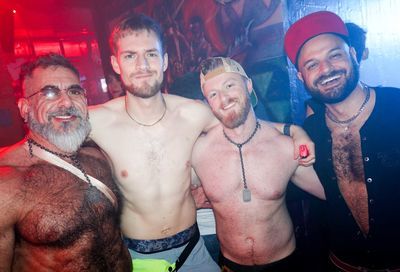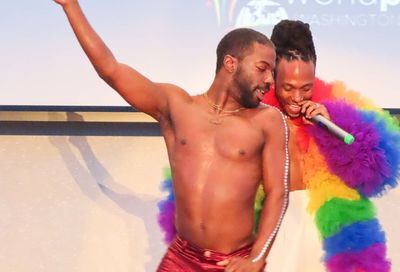Places at the Tables
LGBT community leaders gather to tell Mayor Williams what his priorities should be
There’s a general rule of thumb when determining the level of commitment to an activist cause or outing: If one is willing to come out in the rain, on a weekend, before 9 a.m., then that level can be fairly judged as strong.
Last Saturday, April 30, the commitment level was high as nearly 350 LGBT activists, leaders and community members gathered on a rainy morning at the Greenleaf Recreation Center in Southeast for the city’s Mayor Anthony A. Williams’s first-ever Lesbian, Gay, Bisexual and Transgender Summit. Over the course of the day the diverse crowd would gather at tables arrayed across the center’s basketball court, discussing and recording ideas they hoped would shape the mayor’s and the city’s policies and programs for the LGBT community.
Williams spoke to the group to kick-off the day’s activities, acknowledging the work of his staff and cabinet members on the summit. Just in front of the stage where the mayor spoke, an easel held two photographs of Wanda Alston, whose murder in March shocked the city. As the interim-head of the mayor’s Office of LGBT Affairs, Alston was recognized as one of the prime movers behind the summit, a project that was a compelling goal for her.
 Mayor Anthony Williams (Photo by Todd Franson) |
Acknowledging Alston as a “beloved friend,” Williams paid tribute to her efforts on the summit and shaping the role of the cabinet-level LGBT office.
“I’m sure she’s watching over us right now,” he said.
Williams reiterated his support for legislation that would make the Office of LGBT Affairs a permanent addition to the Office of the Mayor, and once more dismissed arguments that such an office mounts to “co-opting” the movement’s issues as “ridiculous.”
“We need to have this office,” he said. “We need to improve this office.”
Williams also addressed the current controversies between the city and Congress over a recent decision by D.C. Attorney General Robert Spagnoletti that would allow gay couples married in other jurisdictions to jointly file taxes in D.C., although the city reserved the right to reject those filings later. Shortly after news of that decision was published, some congressmen began rumbling that political punishment would await the district if it took any steps to recognize or legalize gay and lesbian marriages.
While Williams has argued recently for caution when it comes to dealing with a hostile Congress, he told the summit crowd that he still supports civil marriage for gay and lesbian couples. To loud applause he pledged his support to combat any effort by Congress to impose any “defense of marriage act” on the city.
“I will fight that to the very end,” he said.
In outlining his hopes for the day, Williams said the summit process, which has been used to gather information and opinions from other groups in the city, is an effort in democracy to bring the people of the city more closely together with the government that should serve them.
“[You] can’t just govern from the top down,” he said.
During the course of the day summit participants focused their discussions on six general areas: cultural competency issues; improving communication with government; issues affecting LGBT youth; business and economic development; health issues; and public safety. Each table reported out a summary of their findings, and that information will be collated into a report for the mayor to help plan and prioritize the administration’s policies.
Organizers said afterward that the report could be ready by late summer or fall.
Many participants said they were pleased with the mayor’s commitment to LGBT issues and the opportunity the summit presented.
Andy Litsky, an Advisory Neighborhood Commission member in Southeast, said the mayor should be “given an enormous amount of credit [for providing] an opportunity to put a number of issues on the table and provide advice and counsel.” Melina Afzel, an activist and consultant in D.C., spoke to participants about cultural competency issues and helped organize the day’s facilitators. She said the summit had “a good energy.” She hoped that participants would all “use this opportunity to make sure their voices are heard.”
Others shared similar outlooks on the summit.
Philip Pannell, who was asked by the mayor to outreach to the community for the summit after Alston’s death, said he was pleased that so many people came who were not affiliated as leaders or organizers of established advocacy groups.
“These are really grassroots people,” he said.
“Any time people gather, it’s a good thing,” said Carlene Cheatham. “To dialogue is even better.”
The emotional peak of the day came during a tribute to Alston in which her partner, Stacey Long, spoke about Alston’s drive and commitment. She said the first time the two spoke, “I know from the sound of her voice that she was…a special person.”
“I could not keep up with Miss Alston,” Long laughed, remembering her partner’s hectic schedule and pace. “There was a lot of life in that woman.”
Support Metro Weekly’s Journalism
These are challenging times for news organizations. And yet it’s crucial we stay active and provide vital resources and information to both our local readers and the world. So won’t you please take a moment and consider supporting Metro Weekly with a membership? For as little as $5 a month, you can help ensure Metro Weekly magazine and MetroWeekly.com remain free, viable resources as we provide the best, most diverse, culturally-resonant LGBTQ coverage in both the D.C. region and around the world. Memberships come with exclusive perks and discounts, your own personal digital delivery of each week’s magazine (and an archive), access to our Member's Lounge when it launches this fall, and exclusive members-only items like Metro Weekly Membership Mugs and Tote Bags! Check out all our membership levels here and please join us today!





















